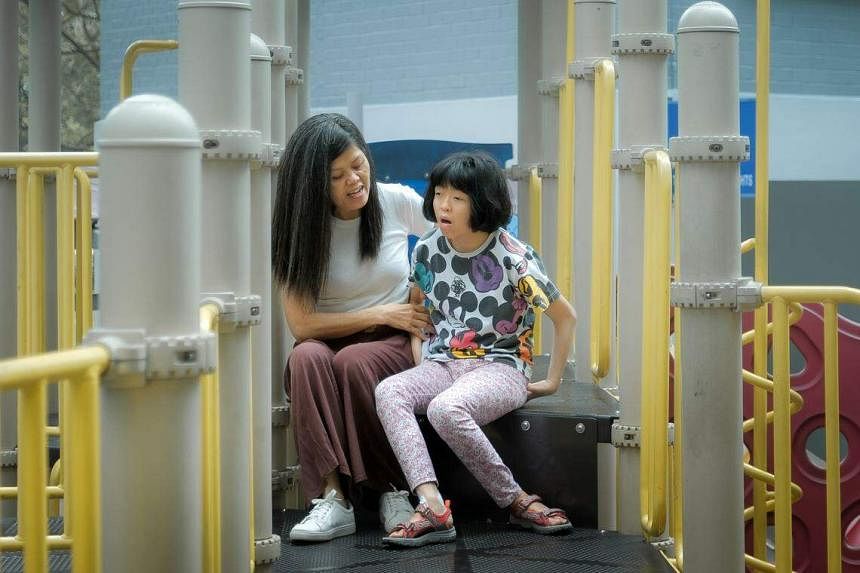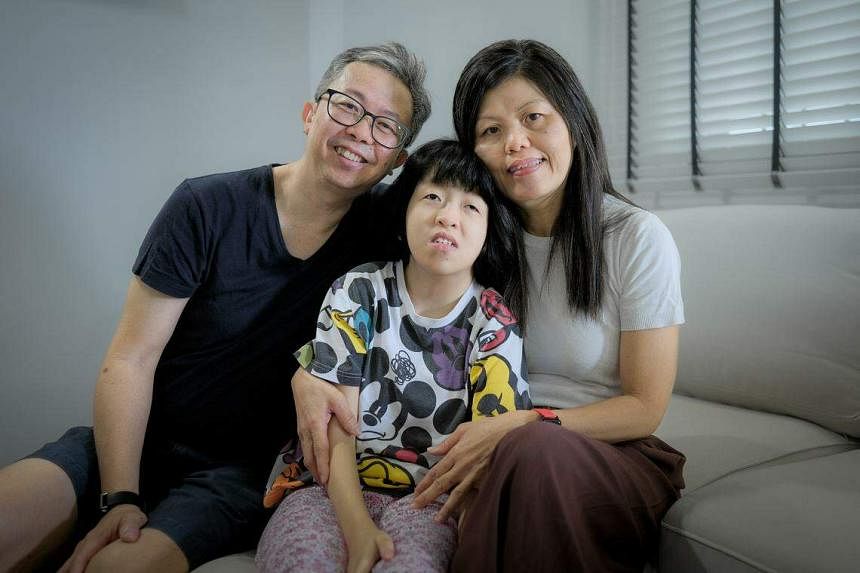SINGAPORE – Housewife Chan Fui Lee, who has a daughter with special needs, will have more convenient access to a caregiver support network – which she is already tapping – when it expands to a place closer to her home.
Twenty-year-old Cheong Chel Sie, who is intellectually disabled and autistic, has frequent meltdowns where she screams and hits and scratches others.
She is unable to speak, walk and develop properly due to a chromosomal condition.
Her 54-year-old mother gave up her job as a marketing manager to care for her when she was four months old, as she required round-the-clock attention.
After Ms Cheong graduated from special education school Rainbow Centre in 2021, Madam Chan found some relief by joining caregiver support network CAREconnect.
Madam Chan also has another daughter, 22, who is studying at a local university.
Taking her younger daughter to activities and connecting with other caregivers in her neighbourhood will soon become more convenient when the support programme is set up at Telok Blangah Community Club near their home.
Currently, they go to Boon Lay Community Club for some events.
The expansion of the CAREconnect programme from Boon Lay and Kampong Glam to Nanyang, Telok Blangah and Bukit Batok East by June was announced by Minister-in-charge of Social Services Integration Desmond Lee on Saturday.
At least 37 more grassroots volunteers and leaders will also be trained to support caregivers of people with disabilities, to make a team of 80 to serve the five regions.
Mr Lee, who is also National Development Minister, said CAREconnect has reached out to 2,800 caregivers through its events and linked up 1,200 caregivers to support groups.
“These numbers show that the efforts are bearing fruit, and the good news is that we have more hands on deck to help grow this important ground-up network,” he added.
Dr Lim Hong Huay, chairman of caregiver support charity CaringSG, which started CAREconnect in December 2021, also announced a programme to help parents of young children with developmental needs.
Step One, which will teach parents about early intervention and connect caregivers in a support group, will be launched in July.
Funded by SG Enable, the initiative aims to reach 400 caregivers within a year, she said.
Dr Lim, who founded CaringSG in 2020, is a developmental paediatrician and has two children with autism.
The programmes are funded by Temasek Foundation and the Enabling Lives Initiative Grant by SG Enable and Tote Board.
When she is not helping her daughter with feeding, toileting and showering, Madam Chan racks her brains for ways to keep her away from her iPad.
But Ms Cheong would put up a fight when she tires of activities.
At a monthly dragon boating session, she threw her paddle away.
During a horse-riding therapy session, she tried to jump off the horse. And when she watches movies, she would kick the seat in front of her and disturb others.
“I want her to do activities with other kids because special needs children like her have no friends,” Madam Chan said.
“I hope Chel Sie can pick up social skills so when we’re gone, she can stay in a home and interact with others.”

She and her husband, a regional pre-sales manager in IT, do not have family in Singapore, having moved here from Malaysia in 2011.
They could not engage a helper able to handle Ms Cheong’s aggressive tendencies, and were turned away by a day activity centre due to her behavioural issues.
She is now attending a private care centre three days a week, for three hours each.
The couple’s elder daughter stays on campus and plays with her sister when she is home on the weekends.
“I don’t want to give her the responsibility of caring for Chel Sie because it’s not her responsibility,” said Madam Chan.
“I just hope they’ll be close so next time when we’re gone, she can get a helper to look after her sister.”
She recounted how she got a glimmer of hope when she first met other parents at Rainbow Centre in 2011.
“I had just moved to Singapore and had no friends here. They told me about the support groups.
“I joined all the support groups and their activities.”

Now, CAREconnect volunteers play with the special needs children, and she can relax with other caregivers in various events such as tea breaks and trishaw rides.
She hopes to engage her younger daughter in more regular activities, as well as get respite from caregiving at least once a month.
“I need time to bond with my family without Chel Sie because usually our attention is focused on her 24/ 7 every day.”
She recalled having to miss her elder daughter’s band performances and graduation ceremonies for secondary school and junior college, as she and her husband take turns caring for Ms Cheong.
The emotional support and other resources shared at support groups keep her going.
“Talking to other caregivers with special needs kids, even if it’s just for one to two hours, feels so good because they understand. There’s no way I can do this alone.
“After we share our experiences and tips to handle our challenges, then I can take it day by day.
“Every day is a new day with new challenges.”
But fears for Ms Cheong’s future remain.
“Parents like me wish we could have a longer life,” Madam Chan added. “I’ll be happy if I live just one more day than her, so I can always protect her.”


